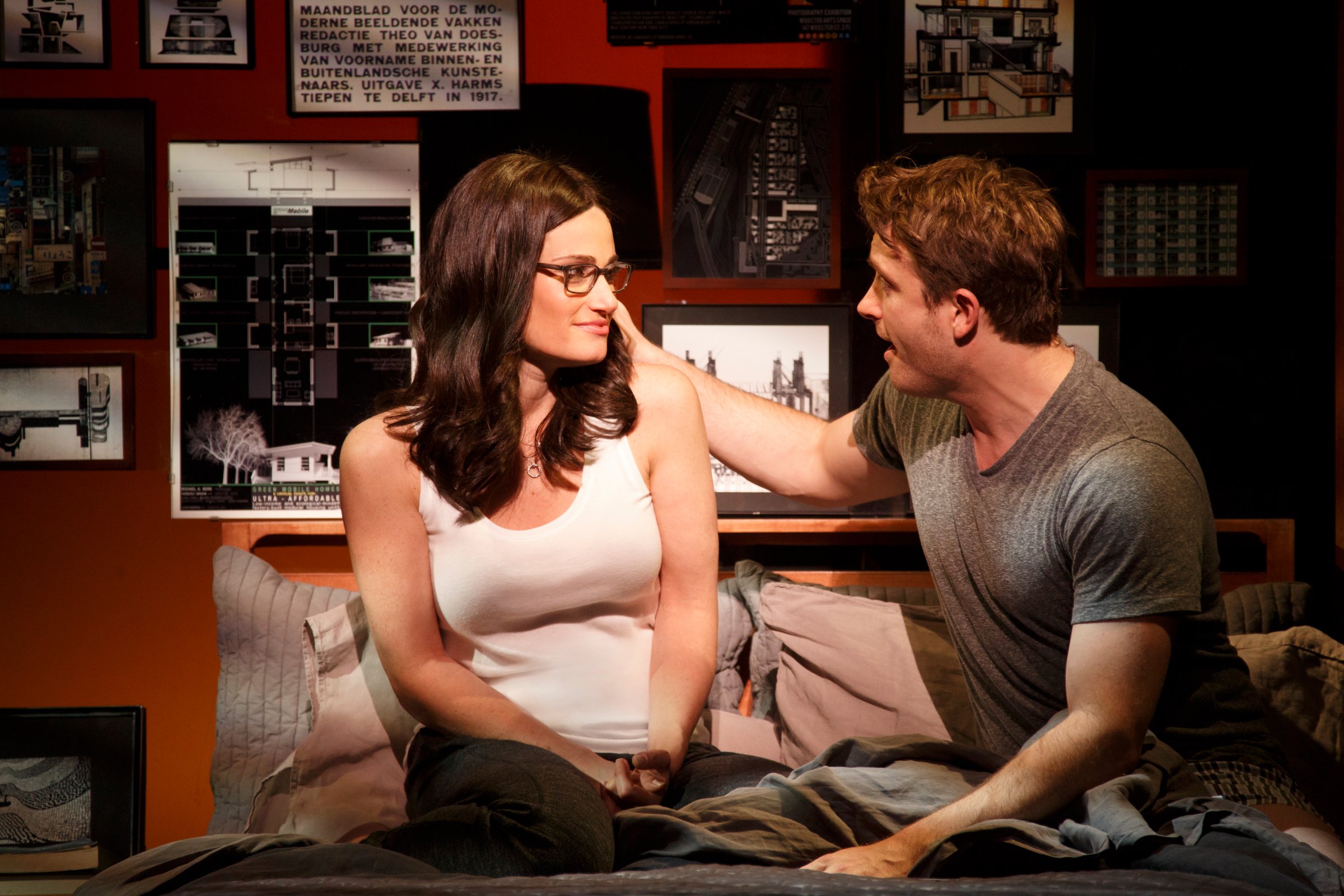
New Yorkers, especially New York theater critics, like to complain that Broadway is being taken over by tourists — the primary target for those big, brand-name musicals we’re seeing more and more of. From my point of view, however, the bigger problem is just the opposite. Too many Broadway shows these days — mostly straight plays, but some musicals as well— are steeped in a New York state of mind, overly obsessed with the experiences, issues and in-jokes of the home-town crowd. Two good (bad) new examples have just arrived.
Terrence McNally’s new play, Mothers and Sons, takes place in a well-appointed apartment on New York’s Upper West Side, where Katharine, a Dallas widow, has just arrived for an unannounced visit to Cal, her son’s former gay lover. It has been 20 years since her son died from AIDS, but Katharine is still dripping with bitterness and resentment — not just over his death, but over the fact that Cal has moved on and is now married to another man, with whom he is raising a six-year-old son.
The play is both didactic and dated, as it contrives to make familiar points about the prejudice still faced by gay people, even as the AIDS crisis has faded and gay marriage become the law of much of the land. The point may be valid and worth making, but almost everything in the play rings false: the implausible chip on Katharine’s shoulder, her tone-deaf awkwardness in dealing with the gay couple, the idealized portrait of their marriage, complete with adorably outspoken six-year-old.
But the conflict is not just between the enlightened gay couple and a prejudiced old woman; it’s between sophisticated, open-minded New Yorkers and those benighted folks who live west of the Hudson. The audience is meant to laugh knowingly at the cracks about East Siders and West Siders, and smirk condescendingly when Katherine confesses she doesn’t know what the AIDS quilt is, and has to be told that the Pines is a gay enclave on Fire Island. Katharine still insists that her son wasn’t gay “until he came to New York,” and she professes to be mystified at New Yorkers who call the place where they live a home. “It’s an apartment,” she says.
It doesn’t help that Tyne Daly, giving a rare bad performance, is about as convincing playing a Dallas matron as Kim Kardashian would be playing Mother Teresa. But none of the actors have much luck trying to inhabit these cardboard characters, set up by a playwright preaching to the local choir.
The new musical If/Then is a more interesting, or at least more complicated, work. Created by the same team behind Next to Normal, winner of the 2009 Tony Award for Best Musical, it tells the story of Elizabeth, a thirtysomething divorcee, who arrives in New York from Phoenix to start a new life. Actually, two lives. In one scenario, Elizabeth lands a big job in the city planning department, has an affair with her boss, rises quickly, but can’t find a mate. In an alternative life, she misses out on the city-planning job, becomes a teacher and winds up marrying an Army doctor. The gimmick is that we watch both her parallel lives unfold simultaneously.
The jump-cuts between her two lives are signaled by lighting changes and name cues: she’s called Liz in one life, Beth in the other. Still, keeping them straight can be a challenge. So, alas, is keeping awake, since each of her lives seem like a collection of New York clichés. There are jokes about Brooklyn, about the inaudible announcements in New York City subways, about people from Phoenix. The Big Apple, meanwhile, is romanticized as a cozy small town, where people meet cute in parks and get offered great jobs that they have to be talked into accepting. Street crime and homelessness? Fuhgeddaboudit.
In a season of big musicals based on hit movies (Rocky, The Bridges of Madison County), the show’s intimate scale and soulful, if unmemorable, soft-rock score (by Tom Kitt and Brian Yorkey) have some appeal. So does star Idina Menzel (who has made the show a near sellout, thanks to John Travolta’s mispronunciation of her name at the Oscars), though her industrial-strength voice and hard-edged manner don’t bring much warmth to the show.
Both she and co-star Anthony Rapp (who plays a bisexual friend who sleeps with Elizabeth in one of her lives — don’t ask me which) had their career breakthroughs in Rent, which is sort of the original New York musical. Yet that show at least had some grit: there were drugs and tragedy, and people actually had to pay their rent. There’s a tragedy and a near-tragedy in If/Then, but they happen only when people go out of town. Back home, it’s still a Yuppie paradise.
More Must-Reads from TIME
- Donald Trump Is TIME's 2024 Person of the Year
- Why We Chose Trump as Person of the Year
- Is Intermittent Fasting Good or Bad for You?
- The 100 Must-Read Books of 2024
- The 20 Best Christmas TV Episodes
- Column: If Optimism Feels Ridiculous Now, Try Hope
- The Future of Climate Action Is Trade Policy
- Merle Bombardieri Is Helping People Make the Baby Decision
Contact us at letters@time.com